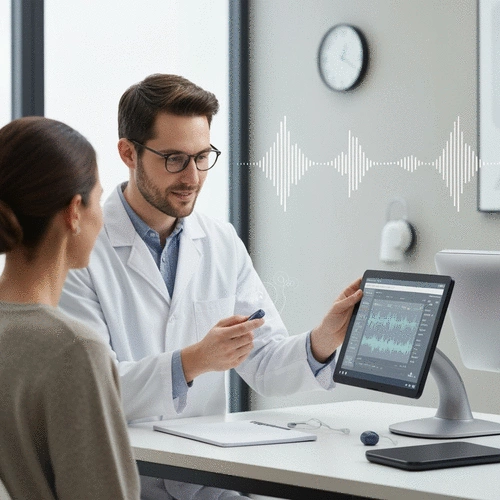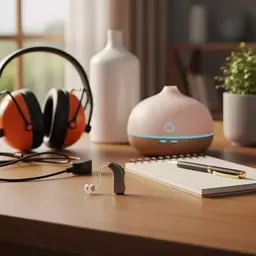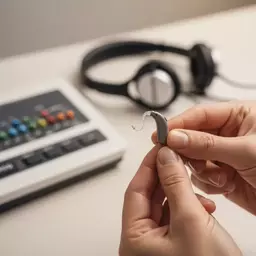As we stand on the threshold of AI-driven audiology, the potential for enhancing patient care and outcomes is more significant than ever. What if the next hearing assessment could be processed in seconds with unparalleled accuracy? The integration of artificial intelligence is not just a technological advancement; it's a transformative shift in how we approach hearing health.
What You Will Learn
- AI-driven audiology enhances diagnostics through rapid analysis of test results, leading to timely decisions.
- Personalized treatment plans generated via AI cater to individual hearing needs, improving patient satisfaction.
- Telehealth options provide remote care, making audiology services accessible to patients in underserved areas.
- Machine learning contributes to predictive analytics, allowing for proactive measures against potential hearing loss.
- AI tools foster improved communication between audiologists and patients, enhancing the overall care experience.
AI's Role in Modern Audiology: Key Areas and Benefits for 2025
The visual below highlights the transformative impact of AI in audiology, focusing on enhanced diagnostics, personalized treatment, and improved patient engagement.
What is AI-Driven Audiology?
Combines machine learning and data analysis to refine audiological practices, offering insights from vast data sets.
- ✓ Improved Diagnostics
- ✓ Personalized Treatment
- ✓ Enhanced Patient Engagement
Key Trends for 2025
Transformative trends shaping audiology care, driven by technological advancements.
- ● Remote Care (Telehealth)
- ● Data-Driven Insights
- ● Smart Hearing Devices
Machine Learning's Impact
Enables enhanced service delivery by analyzing historical data for accurate predictions.
- ★ Predictive Analytics
- ★ Continuous Learning
- ★ Resource Optimization
Balancing AI & Patient Care
Crucial for successful audiology care, maintaining human connection with technological advancement.
- • Personalized Plans
- • Enhanced Communication
- • Continuous Feedback
Understanding the Impact of AI in Audiology Care for 2025
As we look towards 2025, the influence of artificial intelligence (AI) is becoming increasingly evident in the field of audiology. But what exactly does AI-driven audiology mean? This innovative approach harnesses advanced algorithms and data analytics to enhance hearing care services, making them more personalized and effective. It's not just about hearing aids; AI is reshaping how audiologists diagnose, treat, and support their patients.
Most importantly, AI matters because it brings about a higher standard of care. It allows for faster diagnostics, more accurate hearing assessments, and tailored treatment plans that cater to individual needs. This technology empowers audiologists like myself to connect with patients on a deeper level, improving their overall experience and outcomes. For a deeper dive into understanding the AI revolution in audiology, you can read this comprehensive article from AudiologyOnline.
What is AI-Driven Audiology and Why Does It Matter?
AI-driven audiology combines machine learning and data analysis to refine audiological practices. By leveraging technology, audiologists can gain insights that would otherwise remain hidden. For instance, AI can analyze vast amounts of data from hearing tests and patient histories to identify patterns that help in making informed decisions. The transformative potential of AI in healthcare, including audiology, is also highlighted in research available from PMC NCBI.
- Improved Diagnostics: AI algorithms can quickly analyze test results, leading to faster and more accurate diagnoses.
- Personalized Treatment: Tailored recommendations for hearing aids and therapies based on individual needs can be generated.
- Enhanced Patient Engagement: AI tools can facilitate better communication and support between audiologists and patients.
These advancements mean that audiologists are not just hearing specialists; we become partners in our patients' journeys to better hearing health, equipped with the latest tools to empower them.
Key Trends Transforming Audiology Care with Advanced Technology
Several trends are emerging that highlight the transformative power of AI in audiology. Among these, the following stand out:
- Remote Care: Telehealth options allow audiologists to reach patients in remote areas, ensuring access to care regardless of location. The increasing role of AI in various sectors, including healthcare, is also discussed in reports such as those from Congress.gov.
- Data-Driven Insights: Utilizing big data analytics helps audiologists understand patient needs and improve treatment approaches.
- Smart Hearing Devices: Innovations in hearing aids that incorporate AI are leading to improved sound quality and user experiences.
These trends are not just buzzwords; they represent a shift towards a more connected, efficient, and compassionate approach to hearing health care.
The Role of Machine Learning in Enhancing Audiology Services
Machine learning, a subset of AI, plays a pivotal role in audiology, enabling us to enhance service delivery. By analyzing historical data, machine learning models can identify factors that contribute to hearing loss and treatment success. This leads to more accurate predictions and tailored interventions.
- Predictive Analytics: This can forecast potential hearing loss and suggest proactive measures.
- Continuous Learning: AI systems become more effective over time as they learn from new data and patient feedback.
- Resource Optimization: Audiologists can make better use of their time and resources, focusing on what truly matters: patient care.
At HearWise Living, I’m excited about the potential of machine learning to enhance our community’s understanding of hearing care. Together, we can embrace these technologies to create better outcomes for individuals facing hearing challenges!
We Want to Hear From You!
As we explore the future of audiology care, we want to know your thoughts! How do you feel about the integration of AI in hearing health? Share your insights below:
Summarizing the Transformation of Audiology Care through AI
The landscape of audiology care is rapidly evolving, and at HearWise Living, we recognize the profound impact that artificial intelligence (AI) is having on our ability to provide personalized care. The integration of AI tools is not just a trend; it's a transformation that enhances patient experiences and outcomes. As we navigate this change, it's crucial to maintain a balance between the technology we embrace and the human connection we cherish in audiology care.
While AI offers remarkable advancements, it should complement the empathetic approach that defines our field. Patients benefit most when their audiologists leverage technology to enhance personalized care without losing the essential human touch. This balance is what will ultimately define the future of audiology.
The Balance of AI Integration and Patient-Centric Care
Achieving a harmonious relationship between AI capabilities and patient-centered approaches is key to successful audiology care. Here are some ways we can maintain this balance:
- Personalized Treatment Plans: AI tools can analyze data to help create tailored treatment strategies for each patient.
- Enhanced Communication: Utilizing technology to improve dialogue between audiologists and patients fosters understanding and trust.
- Continuous Feedback: Regular check-ins using AI can provide valuable insights for ongoing care adjustments.
Frequently Asked Questions About AI in Audiology
- Q: What is AI-driven audiology?
- A: AI-driven audiology combines machine learning and data analysis to enhance hearing care services, leading to more personalized and effective treatments. It utilizes advanced algorithms to analyze data for improved diagnostics and tailored treatment plans.
- Q: How does AI improve diagnostics in audiology?
- A: AI algorithms can rapidly analyze vast amounts of data from hearing tests and patient histories, identifying patterns and insights that lead to faster and more accurate diagnoses.
- Q: What are the key trends in audiology care for 2025 related to AI?
- A: Key trends include remote care (telehealth), data-driven insights through big data analytics, and the development of smart hearing devices that incorporate AI for improved sound quality and user experience.
- Q: What role does machine learning play in audiology services?
- A: Machine learning enhances audiology services by enabling predictive analytics to forecast potential hearing loss, facilitating continuous learning for AI systems based on new data, and optimizing resources for audiologists.
- Q: How can audiologists balance AI integration with patient-centric care?
- A: Audiologists can balance AI with patient-centric care by using AI tools to create personalized treatment plans, enhancing communication between professionals and patients through technology, and implementing continuous feedback loops to ensure tailored care without losing the human touch.
Recap of Key Points
Here is a quick recap of the important points discussed in the article:
- AI-Driven Audiology: AI enhances hearing care by providing faster diagnostics, personalized treatment plans, and improved patient engagement.
- Key Trends: Telehealth services, data-driven insights, and smart hearing devices are transforming how audiology care is delivered.
- Machine Learning Benefits: Predictive analytics and continuous learning help audiologists optimize patient care and treatment strategies.
- Balance of Technology and Human Touch: Maintaining empathy and personal connection is crucial as technology becomes integrated into audiology care.







